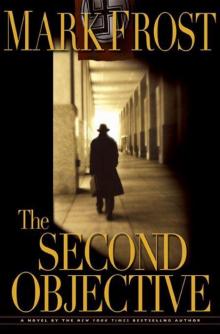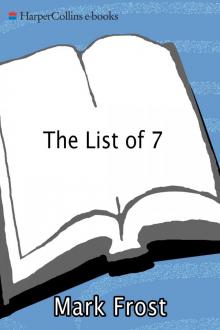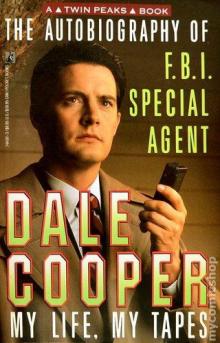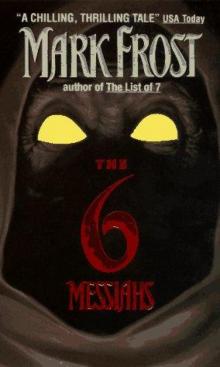- Home
- Mark Frost
Twin Peaks: The Final Dossier Page 4
Twin Peaks: The Final Dossier Read online
Page 4
Three years later, in her senior year, during a visit home for Christmas, something happened after a holiday party one night between Annie and her stepfather. Details are hazy on this, but my reading is this: most likely an attempted sexual assault after a night of heavy drinking. Piecing the story together from police reports and various witness accounts, this assault seems to have either been discovered or interrupted by Vivian, resulting in what one can imagine must have been a devastating confrontation.
His response: Roland Blackburn stormed out of their house, jumped into his deluxe Cadillac DeVille, and within fifteen minutes drove it off a bridge into the frigid Yakima River. The car was retrieved, and Blackburn was declared dead at the scene. Insurance investigators took a long, hard look at the incident; it might have been a suicide, which would have voided Blackburn’s hefty insurance policy. Vivian offered a convincing denial to both the police and the insurance company that anything was troubling Blackburn to that extreme. There was also some evidence—impossible to confirm because of severe damage from the accident—that the car’s brake line may have been tampered with, suggesting foul play, but the report concluded there was not enough evidence to provoke criminal charges. The insurance company was forced to make good on the policy.
But the damage was far from over: Annie Blackburn attempted suicide the night after Roland’s death by downing a bottleful of tranquilizers and slitting her wrists with a box cutter. Discovered by her mother, she was rushed to a local hospital, where they pumped her stomach, stanched the bleeding, and saved her life. Annie remained unresponsive—and borderline catatonic—after the incident, and doctors soon diagnosed her as having suffered a disabling nervous breakdown. Acting on doctors’ recommendations, Vivian arranged for Annie to be treated and confined in a psychiatric hospital in western Washington—coincidentally, the same one where Nadine Hurley and her mother had both been treated years earlier.
Annie spent six months in this facility, undergoing regular psychiatric care and psychological counseling. After Vivian signed her in and dropped her off, once again the only family member who visited Annie regularly was her half sister, Norma. During those months, Vivian became romantically entangled with a charming and shady drifter named Ernie Niles, who one day showed up at the doorstep of the Weary Traveler. A breezy, amiable con man—with a long rap sheet—Ernie quickly zeroed in on Vivian’s apparent vulnerability. Sizing her up as a bereaved widow overwhelmed by circumstance and struggling to run her own business, he sold himself as just the guy to help her out of a tight spot. Starting as an informal handyman at the motel, and soon proving more than handy, within a few weeks Ernie had installed himself in Vivian’s bedroom at the Blackburn manse. But who exactly the victim was in this sordid pas de deux remains an open question.
When Annie was finally released from the hospital, she returned home to find that Ernie Niles had in every way taken Roland’s place. Shortly thereafter, Vivian married Ernie, acquiring her third husband in less than five years. Although larcenous by nature, the feckless Niles was nothing like the predator Blackburn had been, and by all accounts he treated Annie with far more kindness than her mother did. The week after their wedding, Annie hastily returned to her Catholic school in Kennewick, and the following spring she graduated with honors.
Reluctant to return home, and still too fragile to deal with the rigors of independent living at college, Annie made a somewhat impulsive decision to take vows and enter the convent adjacent to her school as a postulant in its spiritual order. While her mother seemed to welcome the decision—it kept Annie out of her hair—Norma did not initially approve of the decision. She declined to intervene, however, ultimately deciding it was in Annie’s best interest to let her make her own decision. A few years down the road, as Norma suspected might happen, Annie’s growing second thoughts about committing the rest of her life to the Church led her to depart the convent before formally taking full vows. Now in her early twenties, and much stronger emotionally and mentally than she’d been in a decade, Annie, at Norma’s invitation, temporarily moved to Twin Peaks to be closer to her sister as she navigated the difficult transition back to civilian life. Norma put her to work as a waitress at the Double R, where Annie seemed to fit right in, and with Vivian and Ernie out of sight and mind, her life finally appeared to be on a healthy track.
Shortly before Annie moved in with Norma, another event of note occurred: Vivian Smythe Niles and husband Ernie arrived in Twin Peaks, unannounced, for a visit, ostensibly so that Vivian could introduce her new husband to Norma. The ever polite and fiercely private Norma introduced Vivian to friends and acquaintances as her mother, declining to elaborate on the twisted circumstances that had brought the woman—who had, all too briefly, been her stepmother—into her life. A classic case of emotional sabotage ensued.
While living off her late husband’s insurance money, Vivian—who fancied herself an expert on most things—had moved to Seattle with Ernie and invested in an area restaurant, which quickly failed. Vivian’s attitude toward Norma’s blue-collar Double R—which was, is, and remains a first-rate iteration of the quintessential small-town American eatery—remained snobby and condescending at best. (It was also, on the face of it, a vivid reminder to Vivian of Marty’s and her own working-class origins, which, rather than a source of pride, she saw only as shameful.) Vivian proceeded to backstab Norma, with a twist of the knife that lapped her previous offenses as an evil fairy-tale stepmother by a country mile. Ahead of their visit, she published an anonymous tip in the local newspaper that a secretive and prominent travel writer and food critic—by the name of M. T. Wentz—would soon be visiting the Double R. Norma, in anticipation of this anonymous visit, brightened up the diner—tablecloths, floral arrangements, candles, etc.—and added some special items to the menu. While Vivian was still in town, M. T. Wentz’s review appeared in print—a scathing and condescending dismissal of the entire Double R enterprise. By all accounts, Norma was emotionally devastated. Vivian then proceeded to take particular delight in revealing to Norma that she was the author of the article. Furious, Norma finally told the woman who had engineered so much of the misery in her family’s life where to go and how to get there. They never spoke to each other again.
As vicious as Vivian’s assault against Norma and her restaurant seemed, she may well have been playing a secondary angle while visiting Twin Peaks. Ernie Niles had always fancied himself a clever and resilient con, but once he entered the ring with Vivian Smythe Lindstrom Blackburn, he was way outside his weight class. It would have taken Vivian very little effort to discover that her dear Ernie had, in the not-too-distant past, done a stretch for fraud in the Washington State Penitentiary that coincided with time served by one Hank Jennings—for vehicular manslaughter, a crime committed as an accomplice of Josie Packard in her failed murder attempt of Andrew Packard—also known as Norma’s husband. Vivian also had to have known that her appearance at the diner with Ernie “the Professor” Niles—as he was known inside the joint—would kick up sparks of recognition with Hank and, knowing how elastic Ernie’s moral controls were, nothing good would come of it. Predictably, none did.
Within days, Hank had embroiled Ernie in a get-rich-quick scheme, running drugs across the Canadian border for his old crime associates, the Renault family—an easy-money offer that Ernie, predictably, could not refuse. Upon returning from their initial trip to set up the deal, Ernie found himself a pawn in another game when he was flipped by DEA agent Denise Bryson—her possession of surveillance photos of Ernie with known criminals and felons, clearly in violation of his parole terms, did the trick. In exchange for immunity from prosecution, Ernie agreed to front a subsequent sting operation run by Bryson and Special Agent Dale Cooper to take down the Renaults.
Niles wore a wire the next day to an arranged “buy” at a run-down rural location called Dead Dog Farm, resulting in near disaster. Ernie’s heavy perspiration under pressure disabled the microphone, and the smoke that leaked from his shirt n
early blew the deal. Only the cool, quick-thinking, and collected reactions of Agents Cooper and Bryson prevented the sting from going sideways; a net dropped on the principals, and the Renaults’ stateside operations were permanently crippled. Hank Jennings, swept up in the melee as an accomplice, had spent his last days as a free man and was soon returned to the state pen for a twenty-five-year stretch. As previously noted in the Briggs dossier, only two years later he would die at the hands of a convict with family connections to the Renaults. It’s an ill wind, etc., but the upshot was that Norma Jennings was finally freed from her lamentable spouse. (More on how that affected her personal life to come.)
For his cooperation with the authorities, Ernie Niles, as promised, was free to go. Grateful he had dodged disaster, a bigger surprise awaited him when he returned home to Seattle, where Vivian—having left Twin Peaks earlier, after her final confrontation with Norma—had arranged a special greeting. Ernie found all his belongings packed and stacked outside the gated drive of their Seattle home, in the pouring rain, at which point a process server slapped him with divorce papers Vivian had prepared.
So, it leads one to wonder, had Vivian, from the start, planned their visit to Twin Peaks as a way to neatly shed a suddenly inconvenient husband? If so, was her deliberate attack against Norma’s self-esteem simply the cherry on top of that sundae? Or was she a multitasking monster who had simply planned to clip the wings of both of these birds with one stone? Either way, the chilling glimpse into this woman’s pathological indifference to every person around her makes your blood run cold. And the full extent of the damage she’d done wasn’t even accounted for yet.
With his marriage to Vivian, Ernie Niles, middle-aged grifter, reached his personal and professional high-water mark. From the moment of his abject dismissal, the rest of Ernie’s life traced a slow, predictable downhill slide to the grave: arrests, convictions, time served, bankruptcy, poverty, alcoholism, homelessness, and a solitary, neglected death in the waiting room of a Pierce County hospital in 2005, his ashes scattered over Puget Sound by a prison charity organization. Exit Ernie Niles. (I know we’re trained to withhold our sympathy from the inveterately criminal, Chief, but I have to confess I find myself feeling something stubbornly like sympathy for the weak-minded, rudderless Ernie. Drifting through life like a dandelion on a foul breeze, dying alone in abject poverty—I’d still prefer his company over that of his brutal ex every time.)
Speaking of whom, Vivian Smythe Lindstrom Blackburn Niles snagged one last husband within a year, a retired insurance executive from Bellevue who fancied the cut of her jib. Vivian had at last convinced a member of the class she’d so desperately aspired to join that she belonged in its marbled, Italianate halls. I truly wish I could report that some version of karmic comeuppance at last paid this human wrecking ball a visit, but, circumstantially, at least, no such evidence is in view. Husband number four—Simon Halliwell was the poor man’s name—passed through the pearly gates in 2009, after choking on a stubborn chunk of cruise ship filet mignon somewhere between Athens and Positano. The widow Halliwell accompanied her husband’s body home and installed him in the family vault, outside Seattle. Vivian was finally left wealthy, secure, and alone, and she seemed to prefer it that way. No more husbands. No more victims. The next time she got her name in the papers was when, after a brief, unspecified illness, she died in 2013 and joined Mr. Halliwell in his mausoleum.
I’d like to think she suffered, felt remorse, or paid some kind of price—deep down inside—for the ragged and roughshod way she ran over every person who crossed her path in life. We’ll never know. Maybe living the way that she did, incapable of love, joy, deep feeling, or even affection, was punishment enough. Maybe life was all a torment to her, no more than a form of mere existing, not living. It would also be easy to assume that, at some point in her life—details of her early years remain hidden in dense fog, impossible now to retrieve—she herself had been hurt or victimized in some way that crippled her inside, an injury she simply felt compelled to pass along. We’ll never know that, either. If that’s not the case, the temptation with Vivian Smith is to conclude that some people are simply born bad, that the path they walk is fated as dark and evil, and woe betide all those who encounter them along the way. Why do the wicked attract us so? What hint of glamour, hope for material gain, or assumption of fleeting happiness do they radiate, that we can find ourselves so easily, fatally taken in? I confess I do not understand this impulse, Chief—not so much that of the criminal at heart (after all, they may be acting with no more forethought than a lion that instinctively shreds the throat of its next meal) as that of the willing victims who line up for the chance to show these monsters their neck. Are we just trapped in an endless loop of some inescapable ecosystem, predators and prey, feeding, dying, and fading away to make room for the next round of actors? What possible bloody purpose could such a miserable cycle serve? What’s our takeaway?
(Forgive the philosophizing. I know it’s our job to keep these predators at bay, to stand between them and their victims. I embrace that role with solemn obligation, but every once in a while the banality of this endless carnage makes me want to scream.)
My anger persists here because of the damage done to her daughters. One more than the other. For Annie Blackburn’s fate, Vivian Smith deserves a special place in hell, and if she didn’t suffer it here, I hope she’s found it in whatever existence awaits beyond.
FEDERAL BUREAU OF INVESTIGATION Field Office Criminal Investigative and Administrative Files
I like to think she found her own fleeting happiness in those few weeks she spent at the Double R: her sister’s unconditional love, the support of a community of friends who genuinely liked her for her charm, intelligence, and beauty. A belated introduction to the kind of world she so wanted to know and deserved to live in. She apparently also experienced a chance to develop the first serious romantic relationship of her adult life, as you know, with none other than your old friend Special Agent Dale Cooper.
As I think about what happened to her subsequently, a temptation rises within me to in some way hold Agent Cooper responsible. There’s a long chain of circumstance here that threads back to the worst—self-admitted—mistake of Cooper’s life. I’m alluding, as I’m sure you know, to his youthful dalliance with the wife of his ex-partner and former mentor, Windom Earle. We know now that Caroline Earle suffered such extreme mental and emotional distress during the course of her marriage that her reaching out to Cooper as she did seems likely to have been a cry for help more than an attempt to seduce. Cooper never could resist a bird with a broken wing—you know as well as I do by now that it’s a central part of his makeup: white knight syndrome, the irresistible urge to rescue every damsel in distress he came across.
(Without stepping too far into profiling here, my feeling is that this relates directly to Cooper’s troubled relationship with his own mother, a fragile woman who suffered through a sizable portion of Cooper’s teenage years in varying degrees of mental and physical suffering—the product of her own turbulent marriage. Before she eventually straightened herself out, Cooper spent a lot of time tending to her, taking care of her—perhaps too much time—and this seems to have encouraged in him a moral conviction, if not an obligation toward “saving” women in jeopardy that he carried into his own adulthood.)
Although Cooper’s relationship with Caroline stayed focused on emotional support and remained, for 99 percent of its duration, platonic, the one moment it crossed over into physical consummation happened to coincide with Windom Earle snapping his strings. This is what we know:
FEDERAL BUREAU OF INVESTIGATION Field Office Criminal Investigative and Administrative Files
As a young man, Windom Earle was, by any definition, a prodigiously talented individual. A chess grandmaster by fourteen, admitted to the University of Pennsylvania at sixteen, a graduate at eighteen, Earle obtained a master’s in criminal justice at Penn State and then applied to and was accepted by the Bureau
as a trainee. (On his application, he cites having seen, at the age of ten, the popular 1951 film I Was a Communist for the F.B.I. as the pivotal inspiration for his law enforcement career.)
After he completed training at Quantico with historically high marks, Earle’s first field assignment came in the mid-sixties, as a liaison and security officer between the Bureau and evolving elements of what had long been known as Project Blue Book, during which time we now know he crossed paths with Douglas Milford. (His subsequent partnership with you, Chief, as a founding member of the Bureau’s Blue Rose group, needs, I’m sure, no detailing here.) In 1973, while serving as a Bureau investigator in the Watergate hearing, Earle met and began dating Caroline Wickam, a young law student who was working on the staff of chief prosecutor Samuel Dash. They married, in a civil ceremony in Washington, D.C., on August 10, 1974, the day after Nixon resigned from office.
By the early eighties, although he continued to work out of the Bureau’s Philadelphia office, Earle and Caroline lived in Pittsburgh, her hometown, where Caroline was now a partner in a thriving corporate law practice. Earle commuted back and forth, usually once or twice a week. They’d been married for ten years and had no children—Caroline was fiercely committed to her career, an apparent point of strain between them—when Earle began working with the next of your protégés to join the Philadelphia office, Dale Cooper.

 Rogue
Rogue The Second Objective
The Second Objective Alliance
Alliance Twin Peaks: The Final Dossier
Twin Peaks: The Final Dossier The Paladin Prophecy
The Paladin Prophecy Game Six: Cincinnati, Boston, and the 1975 World Series: The Triumph of America's Pastime
Game Six: Cincinnati, Boston, and the 1975 World Series: The Triumph of America's Pastime The List of Seven
The List of Seven The Autobiography of FBI Special Agent Dale Cooper
The Autobiography of FBI Special Agent Dale Cooper The Six Messiahs
The Six Messiahs The Secret History of Twin Peaks
The Secret History of Twin Peaks Paladin Prophecy 2: Alliance
Paladin Prophecy 2: Alliance Game Six
Game Six